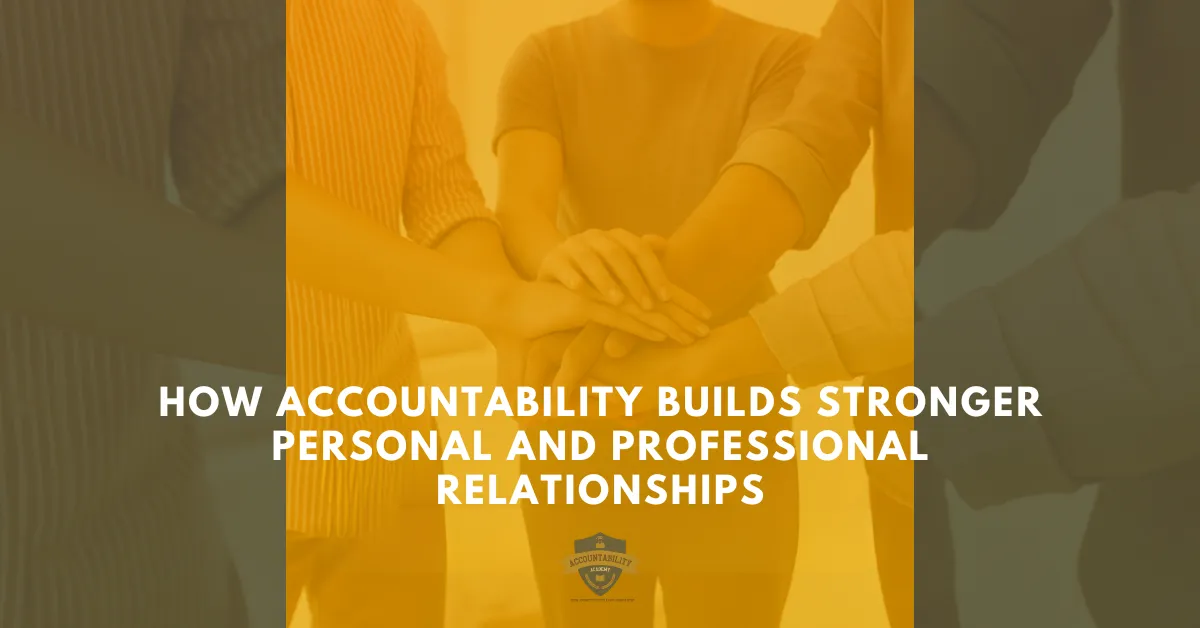
How Accountability Builds Stronger Personal and Professional Relationships
Accountability Isn’t Just About You—It’s About How Others Experience You
When we think of accountability, we often picture solo goal-setting or internal discipline. But one of the most overlooked truths is this: accountability transforms relationships. It’s not just a self-growth tool—it’s a relational superpower.
From your friendships to your family dynamics to your professional network, how accountable you are shapes how others trust, respect, and collaborate with you.
Trust Is Built (or Broken) Through Accountability
Trust isn’t given—it’s earned. And nothing earns trust faster than someone who does what they say they will do.
In a personal relationship, that means showing up on time, keeping promises, and being reliable.
In a workplace, it means meeting deadlines, communicating proactively, and owning your results—even when things go wrong.
Every fulfilled commitment is a deposit into your trust bank. Every missed one is a withdrawal.
Clear Communication Is the Foundation
Accountability thrives on clarity. When expectations are vague, people make assumptions—and that’s where misalignment and tension begin.
Here’s how to communicate accountability clearly:
Be explicit: Don’t just say “I’ll handle it.” Say, “I’ll complete the proposal by Thursday at 4 PM.”
Share progress: Even a quick update like “I’m halfway through, here’s what’s next” keeps trust alive.
Admit roadblocks: If you’re off-track, say so early. Transparency beats silence every time.
Support Goes Both Ways
Being accountable doesn’t mean going it alone. In fact, supporting each other’s goals can make relationships stronger and more resilient.
Check in intentionally: “How’s that goal you shared going?” can mean the world.
Celebrate wins: Recognize progress—yours and theirs.
Offer help: “Want a brainstorm partner?” or “Want me to hold you to that?”
This kind of mutual encouragement builds a culture of growth, collaboration, and honesty.
Conflict Is Inevitable—But Accountability Helps You Handle It
When mistakes happen (and they will), accountability becomes a relationship-saving force. Owning your misstep quickly and sincerely is often more powerful than never making a mistake in the first place.
Approach conflict with:
Calm, open communication
A focus on solutions, not blame
A willingness to adjust or compromise when needed
Real-Life Example
Let’s say you're working on a joint project with a colleague. They’re behind on a deliverable. You could stay silent and let resentment build. Or you could apply accountability-driven communication:
“Hey, I noticed we’re behind on X. Is there anything I can do to help us get back on track?”
“I just wanted to check in on the timeline—how are things going on your end?”
This opens the door for honest dialogue and support instead of bottling frustration.
Final Thought: Accountability Is a Relationship Skill
Being accountable isn’t about being perfect. It’s about being consistent, transparent, and human. When others know they can rely on you—and that you own your part in any situation—your relationships deepen in trust and impact.
Think of one relationship—professional or personal—where more accountability could make a difference. This week, set a clear expectation, follow through on it, and reflect on the impact. Let us know how it goes!
